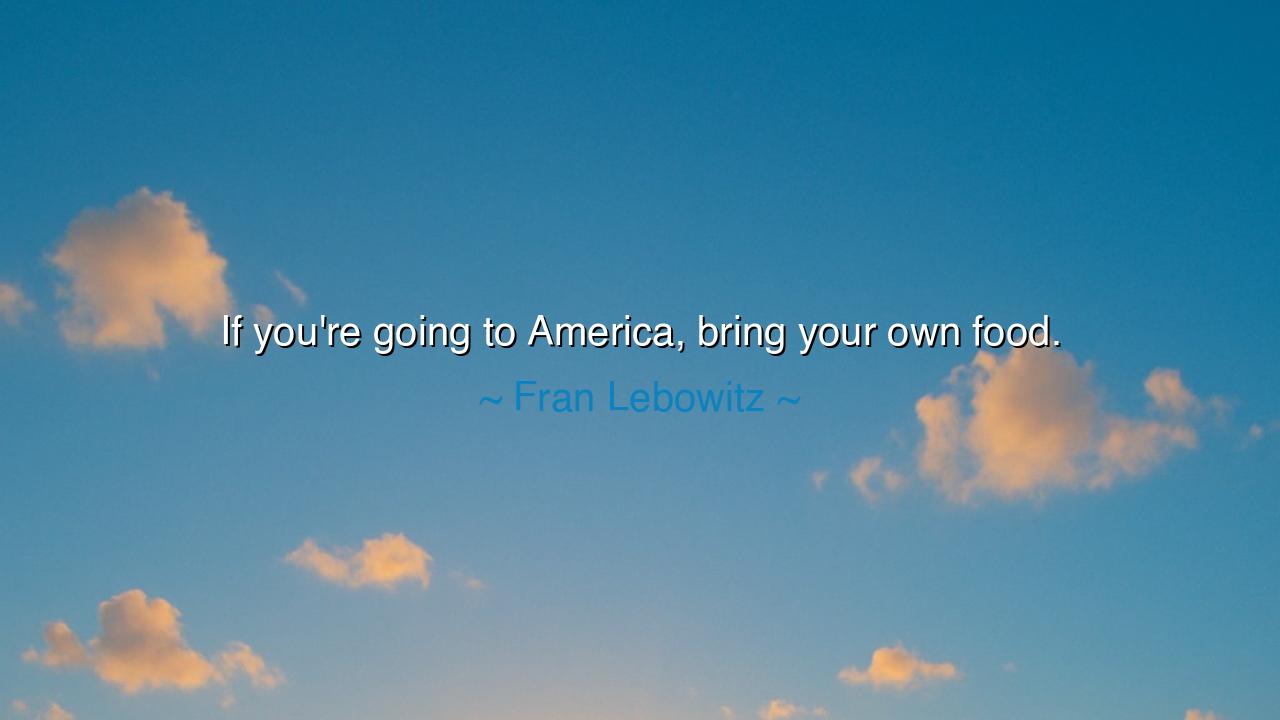
If you're going to America, bring your own food.






Host:
The airport lounge was buzzing — the sound of rolling suitcases, overhead announcements, and that particular hum of movement that only exists in places of transition. Outside the tall glass windows, planes taxied across a rain-slick runway, their blinking lights cutting through the gray sky like promises too fast to catch.
Amid the bustle, Jack sat slouched in a corner chair, a half-finished espresso beside him and a newspaper folded under his arm. His expression was half amusement, half exhaustion — the look of a man who has seen too many cities and eaten too many bad sandwiches. Across from him, Jeeny perched elegantly on her suitcase, one leg crossed over the other, a pastry in hand and a mischievous glint in her eye.
Jeeny: [grinning] “Fran Lebowitz once said, ‘If you’re going to America, bring your own food.’”
Jack: [smirking] “Ah, Fran — queen of discontent, patron saint of sarcasm. She never said anything without seasoning it with cynicism.”
Jeeny: “But admit it — she’s right. There’s truth hiding in that joke.”
Host:
A loudspeaker crackled overhead, announcing yet another delayed flight. People groaned in a half-hearted chorus. The smell of burnt coffee and microwave pretzels filled the air like a metaphor too on-the-nose to ignore.
Jack: [dryly] “You mean the truth that American food tastes like convenience?”
Jeeny: [laughing] “Or the truth that we’ve traded nourishment for efficiency. That eating, like everything else, has become a performance of speed.”
Jack: “Yeah. Meals used to mean something — time, conversation, community. Now they’re just refueling stations between obligations.”
Jeeny: “Exactly. That’s what Fran’s really mocking. Not the cuisine — the culture that forgets eating is an art.”
Host:
The barista at the counter called out a name that no one claimed. A cup sat abandoned, its foam already deflating — a perfect symbol of modern life: made in haste, forgotten in seconds.
Jack: “You know, when Lebowitz jokes about bringing your own food, she’s talking about more than food. She’s talking about identity. About authenticity in a culture that mass-produces everything — even taste.”
Jeeny: [nodding] “Yes. She’s poking fun at the way America sells comfort but forgets substance. We want flavor without patience, beauty without effort, success without time.”
Jack: [grinning] “You sound like you’re quoting her now.”
Jeeny: “I might be channeling her. She’s the ghost haunting every culture that values convenience over craftsmanship.”
Jack: “So she’s not just complaining about hamburgers — she’s mourning meaning.”
Jeeny: [smiling] “Exactly. Only Fran could turn a dinner joke into cultural critique.”
Host:
Outside, the rain streaked the window in slow, uneven lines, distorting the reflection of neon lights and tired faces. Travelers passed by — hurried, expressionless, tethered to phones, chasing time zones.
Jack: “You know what’s funny? She’s right in a literal sense too. I’ve traveled coast to coast — everything tastes the same. Same sauces, same salt, same corporate smile.”
Jeeny: “That’s globalization’s gift — and curse. You can find comfort anywhere, but you can’t find character.”
Jack: [leaning back] “It’s the great flattening. The world’s flavors used to tell its stories. Now they tell its branding.”
Jeeny: “And that’s what she’s warning us about — that homogenization isn’t progress. It’s cultural amnesia.”
Jack: “You know, you’d think the wealthiest country on earth would have more flavor.”
Jeeny: “It does — but it’s in its people, not its plates.”
Host:
A child laughed nearby, chasing his reflection in the glass. The sound cut through the dull rhythm of adult fatigue, light and unselfconscious. Jeeny smiled faintly at the sound.
Jeeny: “Maybe that’s what Lebowitz misses — humanity. The unhurried pleasure of things done with care. Whether it’s food, conversation, or art.”
Jack: [stirring his coffee] “But America doesn’t run on care. It runs on caffeine and ambition.”
Jeeny: “And burnout.”
Jack: [chuckling] “Exactly. We’ve learned to feed our appetites, not our souls.”
Jeeny: “And so Fran, with her biting wit, says, ‘Bring your own food.’ Meaning — bring your own values, your own patience, your own appetite for something real.”
Host:
The boarding announcement for their flight echoed through the lounge. People began to move — the synchronized choreography of travelers conditioned by time and schedules. Jack gathered his coat, Jeeny stood, stretching gracefully.
Jack: [with a half-smile] “You know, sometimes I think Fran’s cynicism is just nostalgia disguised as humor. She doesn’t hate America — she just misses its sincerity.”
Jeeny: “And she’s right to. Because underneath the sarcasm, she’s saying something simple: life isn’t meant to be fast food.”
Jack: “It’s meant to be a slow meal shared.”
Jeeny: [smiling] “Exactly. The table — that’s where civilization begins.”
Host:
They walked toward the gate, the buzz of announcements blending into the hum of jet engines outside. The fluorescent lights flickered overhead, sterile and bright. And yet, there was something human in their laughter — something warm against the machinery of modernity.
Jack: “You think she’d approve of us quoting her in an airport café?”
Jeeny: “No. She’d probably roll her eyes and say, ‘You’re overthinking it.’”
Jack: [grinning] “Then she’d complain about the coffee.”
Jeeny: “And still finish the cup.”
Host:
The camera would linger as they disappeared down the jet bridge — two silhouettes swallowed by light. The rain kept falling, steady and indifferent, washing reflections into one another.
And as the screen dimmed, Fran Lebowitz’s wit would linger like perfume after laughter — sharp, defiant, and deeply human:
If you’re going to America, bring your own food.
Not because theirs is tasteless,
but because the world’s richest nation
forgets that nourishment takes time.
Bring your patience, your humor, your humanity —
the ingredients that can’t be sold or shipped.
For in a land that feeds endlessly,
it is meaning — not meals —
that too often goes hungry.






AAdministratorAdministrator
Welcome, honored guests. Please leave a comment, we will respond soon